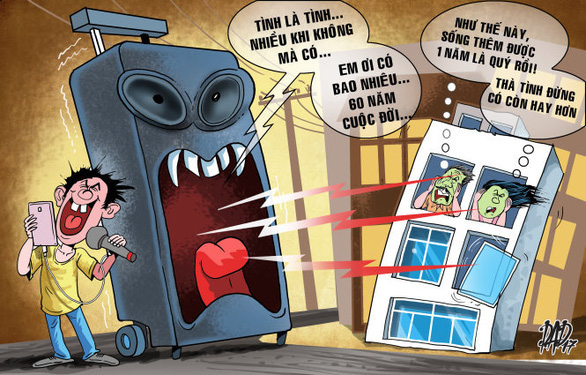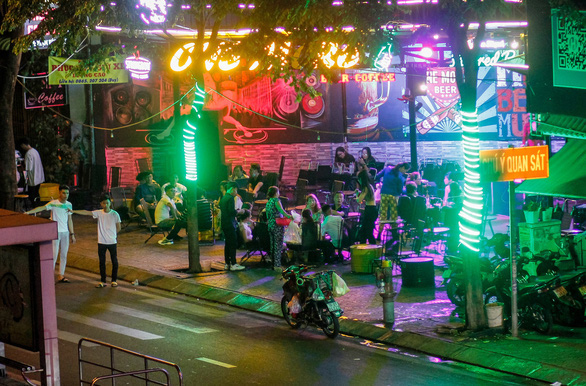They should have compulsory singing lessons, shouldn’t they?
It will not fix the problem but if you’re going to drive everyone nuts, at least do it in style. Moves have been afoot to crack down on street noise in Da Nang and Ho Chi Minh City from shop front karaoke speakers to the outrageously loud music coming from pubs and bars in these crowded cities.
COVID-19 did affect the number of outdoor and street venues which made things quieter in Ho Chi Minh City for a while but with the lifting of bans and restrictions, it will all come back with a vengeance. The current plan for both cities is to issue warnings until June, when fines and penalties will be imposed. There’s obviously little sympathy for the street singers worried about losing their businesses yet some karaoke venues fear that they’ll struggle to recover economically from recent lockdown measures.
At least it’s good on the police for trying. Although some vexing issues about shortages of noise metering equipment exist, given the staggeringly high volumes, I don’t think anyone’s going to have much difficulty identifying the culprits. Unfortunately, defiance is rampant and moments after the police have left, owners and managers allow the din to continue.
It’s unclear at the time of writing if fines rise in cost from June but the more difficult question would be what to do if people repeat their annoying behavior. Can and will the local authorities confiscate the outdoor music equipment and how would locals recover their stuff later? Could you take the gear from someone’s living room? Would anyone bother to crack down on wedding and party functions?
Finally, would the local authorities respect these upcoming enforcements on their own events. Could anyone really have the presence of mind to turn down the loudspeaker announcements and broadcast at a reasonable hour instead of first thing in the morning and evening?
The logistics of storing seized equipment are not that difficult given the large areas already storing confiscated counterfeit goods and motorbikes, as well as an additional threat to force locals to modify their habits. There could also be regular auctioning of goods not reclaimed or for which fines have not yet been paid, say within three months. This happens in my home country of Australia, where noise penalties are much higher than those in Vietnam.
The only realistic option in the long run is attitudinal training; changing social behavior though education and government campaigns – similar to the efforts to get everyone to wear crash helmets. Yet to achieve that requires a better understanding of how excessive noise has become such a ‘normalized’ part of Vietnamese life.
|
|
| A beer joint blasts loud music at night along Pham Van Dong Boulevard in Ho Chi Minh City. Photo: Chau Tuan / Tuoi Tre |
Long before anyone could buy music systems, noise was still everywhere, such as the banging of gongs for festivals and funerals, including bands; public announcements shouted in the streets; fireworks and banging anything to scare away evil spirits and ghosts; and so on. Besides, as every member of a rock concert knows, loud is fun!
What’s changed is the modern ability for anyone with enough money to become an amateur public performer. That’s also been fueled by the explosion in public festivals and community performance venues. That’s a chance to show off and let off steam. Ordinarily, this wouldn’t be a problem with an abundance of karaoke bars with soundproofing. But this is the public factor, directly out of your living room to invade the street without agreement from other people. For the sake of peace, most folks put up with the occasional neighbors needing to entertain themselves at 120 decibels (the sound of a jet engine). If that goes on for more than thirty minutes, it can cause serious hearing damage and health stress such as lack of sleep or the inability to relax at home.
In my area, people calm down the noise after 10:00 pm; however, there’s always that one idiot who decides to use a hammer at night. I’ve given up trying to get neighbors to reduce the volume – even worse – how dare a foreigner tell a Vietnamese what to do?
So why? One shop owner told a friend of mine that he does loud music to attract customers, which makes no sense if you can’t be comfortable and talk without shouting. One of my neighbors told me it’s because everyone does it, which doesn’t make sense to be as loud as the person next to you. In the end, I guess people do it just for something to do.
One approach (with attitudinal training) could be to promote the idea that loud noise is socially unacceptable (many tell me this, but are afraid to challenge their friends) and it’s not normal. I believe many Vietnamese want to see change, especially if they’ve traveled to another country which is quieter. If this is already possible regarding helmets, then why not noise?
I think it will get interesting in June!




















































